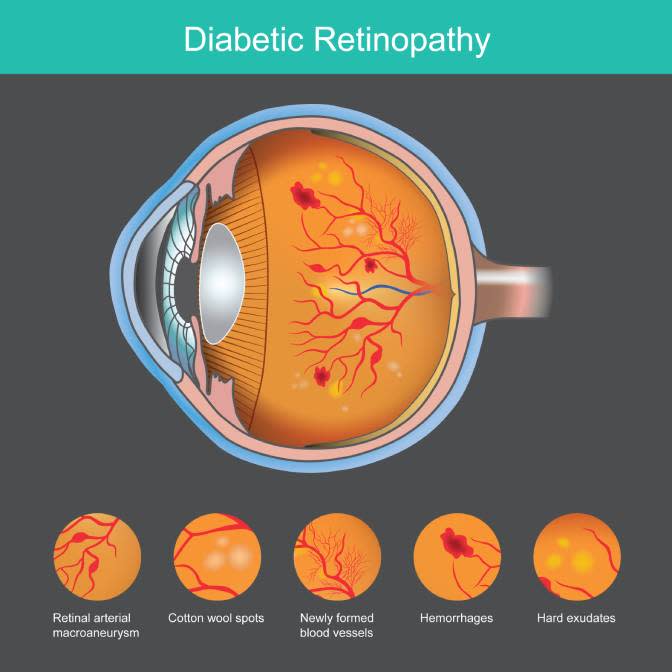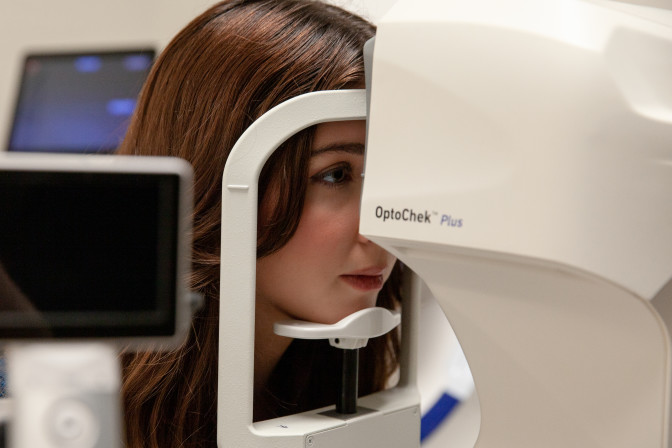Buy one pair of eyeglasses, get a second pair 50% off!
*Restrictions apply. Click here for details.
Diabetic Retinopathy Screenings at Nationwide Vision
Diabetic Retinopathy Screenings at Nationwide Vision

There are over 425 million people in the world who have either type 1 or type 2 diabetes. If you have diabetes you may be at risk for a sight threatening disease called diabetic retinopathy. Diabetic retinopathy is fairly common in diabetics and the longer you have had diabetes, the greater your risk factor is. Additionally, those with poor control of their blood sugar have an increased risk of developing retinopathy. For every 1% increase in hemoglobin A1c over 7% there is a 50% increased risk in developing proliferative diabetic retinopathy If left untreated, diabetic retinopathy can lead to vision problems and even blindness. When your body is faced with high blood sugar levels it causes damage to the blood vessels located in the retina. These changes can cause vision loss in diabetic patients of all ages. It is estimated that 80% of diabetic patients will eventually develop some stage of diabetic retinopathy. The doctors of Nationwide Optometry are experts at diagnosing diabetic retinopathy and helping patients manage their condition.
Find Diabetic Retinopathy Screenings Near You

Nationwide Optometry has diabetic retinopathy specialists at our Arizona locations. Click to find a location near you.
What Is Diabetic Retinopathy?
Those who have had diabetes for an extended period of time are more likely to develop diabetic retinopathy. Diabetic retinopathy is the most common form of diabetic eye disease. It occurs when high blood sugar levels cause changes that damage blood vessels in the retina. These changes can cause swelling to the vessels (macular edema) and leak fluid into the rear of the eye. If diabetic retinopathy goes untreated it will gradually become more serious and as it progresses it can affect your vision and lead to blindness. Diabetic retinopathy is the leading cause of acquired blindness in patients over age 65.
Diabetic macular edema (DME) occurs when there is fluid build up in the macula which is the central portion of the retina that we use whenever we look straight ahead. This area of the retina is responsible for our clearest vision. Diabetic macular edema is responsible for about 50% of vision loss in patients with diabetic retinopathy. If you have diabetes, you should have a dilated eye examination at least once every year to check for diabetic retinopathy.
What Are The Early Signs & Symptoms of Diabetic Retinopathy?
Unfortunately, you could have diabetic retinopathy without knowing it because there are no early symptoms. The disease will progress until vision loss begins to occur in both eyes. As diabetic retinopathy progresses, you may experience blurry or distorted vision, loss of central and color vision, poor night vision, blank or dark areas in the field of vision, and floaters. Schedule an exam with one of our expert doctors as soon as possible if you have experienced any of these symptoms.
Risk Factors for Diabetic Retinopathy
If you have any of the following risk factors it is important that you have a retinopathy screening examination as soon as possible.
Protein in urine
Poor blood glucose control (Fasting blood sugar above 100, A1c over 7% or any blood glucose reading over 200)
Raised fats in the blood
High blood pressure
If you have type 1 or type 2 diabetes you are at risk for developing diabetic retinopathy. Because the condition is caused by increased blood sugar, monitoring your blood glucose levels closely, watching your diet, and exercising is important.
Get Checked for Diabetic Retinopathy at Nationwide Vision

If you have type 1 or type 2 diabetes please give us a call to schedule an appointment at your nearest Nationwide Vision location. Our expert doctors are ready to give retinal screenings and get you on your treatment plan for healthier eyes.
Frequently Asked Questions About Diabetic Retinopathy
In some cases, very mild forms can be resolved with strict blood glucose control. Early detection is the best way you can prevent diabetic retinopathy from taking your vision.
See an eye doctor every few months and treat damage before developing symptoms.
The most important step is to control your diabetes. For advanced cases, some treatments may be available, including laser treatment to treat the growth of new blood vessels, eye injections to treat retinal swelling and leaking vessels and eye surgery to remove blood or scar tissue in advanced cases.
If you have diabetes you should have a complete eye exam at least once a year. Your primary care physician may recommend more regular screenings based on the extent of your retinal damage and any other complications.
